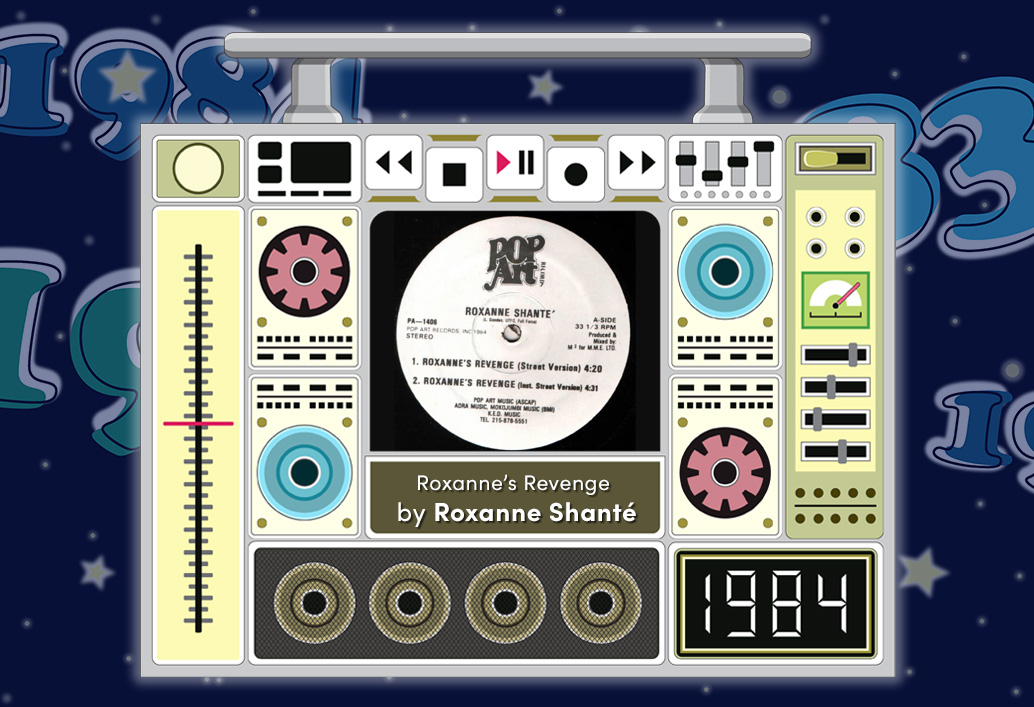
Roxanne’s Revenge: Roxanne Shanté – 1984
Hey, y’all! ceetay here! Okay, let’s cut to my lame excuse. I had to move
Hey, Wassup! Happy New… Year? I guess? Didn’t mean to ghost you after… how many months has it been now? Three… four months? Yeeeeaaaah, about that. Well, let me first back up and introduce myself for you first time blog readers. I’m ceetay, the Doctor Brown to your Marty McFly. With each post I invite you to step into my Rap Waveback Machine and travel back to the old school and celebrate what Rap and Hip Hip as a whole had to offer.
Now that’s out of the way, I’ll tell you why I’ve been MIA. While making the routine machine checkup, I found a few cracks underneath the right side of the engine haul. Without the proper replacement part, our time travel trips would’ve been over. But y’all know I wasn’t havin’ it! I searched all over the internet to find one dealer who had the right part at the right price. Ordered it and waited… and waited. Two months later, I still waited, til’ the package arrived. It took another month to figure out how to replace the damn thing. After countless tests, the Rap Waveback Machine is finally up to time travel regulations.
Now that you know, let’s go back to the year when the world watched Lady Diana Spencer marry Prince Charles during the “Wedding of the Century”. A year when American hostages in Iran were finally freed after 444 days. And a year when Raiders of the Lost Ark first exploded onto movie theaters. Get ready ‘cause 1981 was on like Donkey Kong!
Hit the play button!
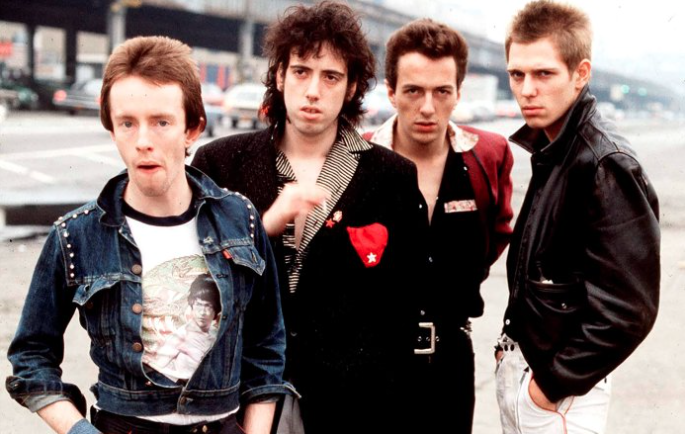
The Clash. Why in the hell am I focusing on a white British Punk Rock band? Two words: Magnificent Seven. Okay, two more words: Magnificent Dance. Two years after putting rap on wax, it was still in its infancy; no one knew which direction it would go. It was also the perfect climate for a punk rock band to slip through and drop an instant classic while no one was looking.
When I first heard Magnificent Dance on the radio it grabbed my attention. The track started with guy saying:
Don’t you ever stop long enough to start/
Take your car outta that gear/
Don’t you ever stop long enough to start/
Get your car outta that gear.
Before I had the chance to understand what that meant, the rapid fire combination of bass, bongos, drums and triangle chimes assaulted my ear drums like an alarm clock. It was one of those lasting first impressions that musicians strive their entire careers to achieve. What came next was the steady drum beat and the familiar funky bassline used in early rap recordings. Soon after an electric piano, not a synthesizer, an electric piano slid in, sprinkling smooth, soulful piano chords. Completing the irresistible sound was a touch of electric guitar. All these ingredients combined created the perfect recipe for people to dance their asses off.
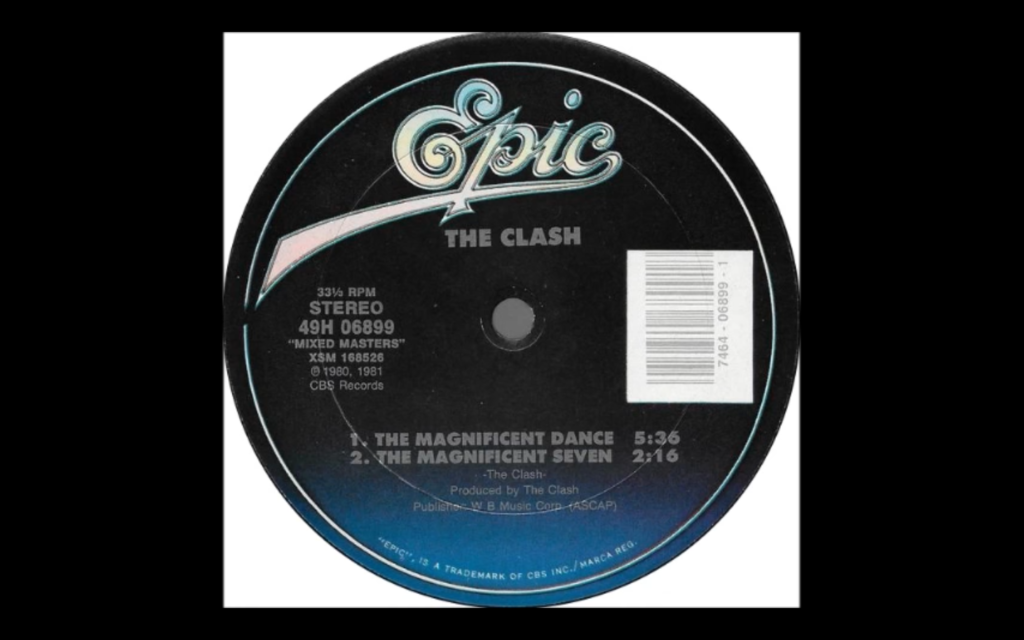
I hope you caught me mentioning Magnificent Dance not Magnificent Seven. If it weren’t for the weekend mastermixes constantly playing on overnight radio time slots, I would’ve missed either version of that song entirely! Yes, Magnificent Seven is technically a rap song, but it wasn’t treated as such, at least not in New York. It was never played on Mr. Magic’s Rap Attack on ‘BLS or on DJ Red Alert or Chuck Chillout’s weekend shows on KISS-FM. I only heard the instrumental, Magnificent Dance, simply because of a recording production practice called a remix.
This technique was introduced by Disco nightclub DJs. The main purpose was to expand the deejay’s creativity. They wanted to add elements to a song that were beyond what they could do during their live sets. If you’re thinking a remix is another word for a dub, think again. A dub is mostly an instrumental track with selected vocal echoes and reverbs scattered throughout the song. It has been commonly used within the Reggae genre. Anywho, the sad reality was, if Magnificent Seven didn’t have Magnificent Dance as an alternative, the record wouldn’t have had the chance to flourish. This was one of the early examples of how remixes changed the fate of a record.
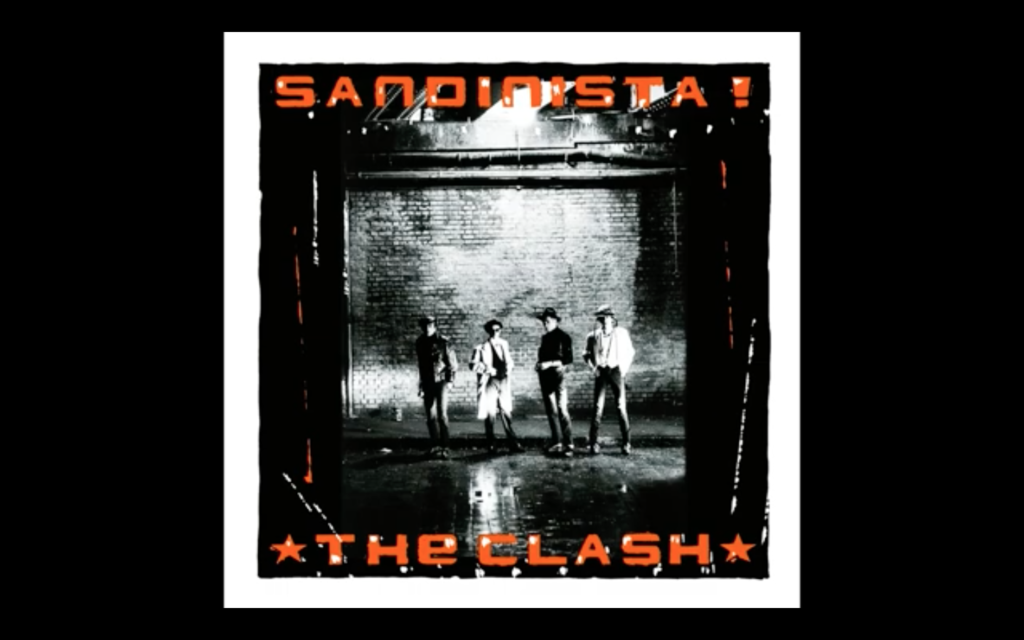
There was no surprise the two most pulverizing new music styles were direct responses to Trickle Down Economics and the overall abandonment of the lower economic class. Rap and Punk Rock shared the same anger and rebellious spirit. They just expressed those emotions differently by creating two vastly different art forms. So, there shouldn’t have been a surprise when some artists in both genres decided to collaborate with each other. Now, don’t get it twisted. It wasn’t like the majority of Rap and Punk Rock fans, and musicians, came together to defeat a common enemy like Rocky Balboa and Apollo Creed in Rocky 3. It’s an annoying human trait to betray your own best interests. How else could you explain the popularity of U.S. President Ronald Reagan and British Prime Minister Margaret Thatcher during this time? These two politicians represented everything Rap and Punk Rock were against. Despite the racial and cultural differences, there were a few punk rock artists who hung out and worked with rap artists and participated in Hip Hip culture overall.
The most notable collaboration was Blondie. I never thought the band, fronted by lead singer Debbie Harry, who made Heart of Glass, One Way Or Another and Call Me into monster hits would ever make a bass heavy, disco song like Rapture. It was more shocking when Debbie started rapping about… I wasn’t sure what she was rapping about. However, that didn’t stop Rapture from hitting the #1 spot on the Billboard chart in 1981.
Blondie’s contributions went farther than that. They helped filmmaker Charlie Ahearn, which included producing the soundtrack for the groundbreaking Hip Hop film Wild Style. Also when Debbie Harry hosted SNL, she encouraged the show’s producers to invite Funky Four Plus One More as musical guests, making them the first rap group to perform on a national network broadcasting show.
Another notable collaboration was with Malcolm McLaren. He was the manager of the legendary British Punk Rock band, The Sex Pilots. Malcolm somehow caught wind of the music brewing in New York City and eventually teamed up with a rap duo called World Famous Supreme Team. MCs Sedivine The Mastermind and Just Allah the Superstar hosted a non-commercial overnight radio show on WHBI. It was an independent station that also gave Mr. Magic his start on New York radio. Malcolm McLaren and World Famous Supreme Team released their first hit Buffalo Gals in 1982 and went on to make several more hits.
Between Rapture and Buffalo Gals, Magnificent Seven (vocal version) didn’t have the notoriety or the commercial success the other two singles had. I’d argue that it may have been by design.
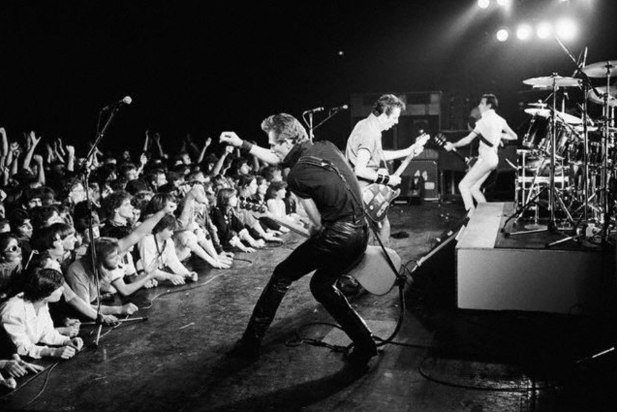
Did you know that contagiously funky Magnificent Dance remix was about class politics? No? Neither did I. It took me over a decade to discover there were lyrics to this song! I happened to stumble upon searching Magnificent Dance on Amazon one day on a whim. When the results revealed The Clash created that song, I immediately bought the CD that included their greatest hits.
Remember I mentioned earlier about the rapid fire percussion sounding like an alarm clock? It might have been on purpose. The first lines went: “Ring, ring. It’s 7:00 am/ Move y’self to go again…/” as if the rhyme was a direct response after an alarm clock jolted you out of your dream and into reality. The rap sounded good, so far. When my ears reached these lines:
Wave bub-bub-bub-bye to the boss/
It’s our profit. It’s his loss/
But anyway, the lunch bell rings/
Take one hour. Do your thanng!/
Take one hour? It dawned on me what this song was really about. It was a sardonic, mocking commentary about the daily 9-to-5 work rot. The Magnificent Seven hours people have to endure each day. My brain screamed “Why is this the first time I’m hearing this?” The lyrics made me love this song even more! It was a cleverly bold indictment of the brainless cog in the wheel syndrome inside the corporate machine.
It was a similar tactic to Dolly Parton’s mega hit 9 to 5, the title song to the hit movie of the same name. Not only were 9 to 5 and Magnificent Seven released in the same year, they also shared the same goal: to satirize the day-to-day life of the average worker. No, seriously. Skip past the obvious bias. Focus beyond the peppy, happy melody. Discover the words describing the daily slights and aggravating mistreatment workers routinely tolerate just to make a living.
The major difference between these two songs was The Clash used a style of music many didn’t know or respect. But let’s face it, the major offense was mocking the foundation of the capitalistic system. Try lobbying for a song that dares to utter Karl Marx and Fredrich Engels’ names and see how fast you’ll be banned from any radio station. This was one of the reasons The Clash became my favorite Punk Rock band.
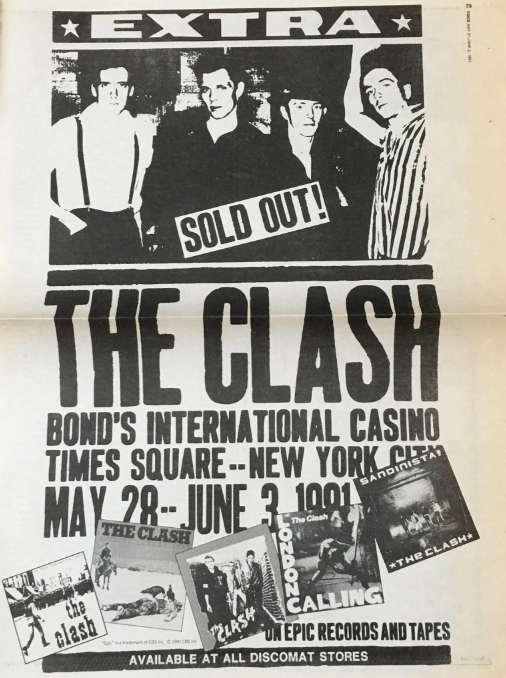
Like most Punk Rock bands, The Clash had kick ass messages in their music. What separated them from other bands was how they embraced other forms of music like Disco/R&B; Rock The Casbah was their biggest crossover hit. I constantly heard it on heavy radio rotation on both Black and Top 40 radio stations. They played Reggae, which included the song Guns of Brixton; a song about a black British neighborhood that suffering under police brutality. Ain’t that a surprise?! It doesn’t just happen in the U.S., folks! Other genres they explored were Ska, Rockabilly, Country and Gospel. It was an eye opener to find out Grand Master Flash and The Furious Five was one of the opening acts for The Clash at NYC’s Bond’s International Hotel & Casino in 1981. So, it made sense they would record their own rap song and Magnificent Seven wasn’t the only one. Lightning Strikes (Not Once but Twice) appeared on the 1980 album Sandinista! If you lived in the U.S. or the U.K. in the 80s, the name of this album alone immediately gave away the band’s leftist politics, signaling the support against the U.S. backed, and funded Contras during the Nicaraguan civil war.
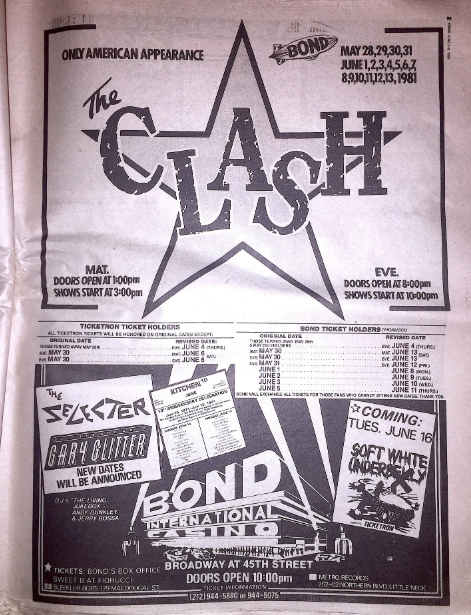
In terms of recognition in Rock and Punk Rock circles, The Clash has legendary status, deservingly so. In Rap music circles, unfortunately, they have been a footnote compared to Blondie and Malcolm McLaren, then and now. This was a missed opportunity for other groups to not only rap about political issue about race, but also a wider interracial discussion about class. The Clash could’ve helped spark that discussion as much as Public Enemy inspired discussion about black issues.
If it weren’t for The Clash’s overall influence, we may not have had The Beastie Boys. They started as a punk rock group with their first EP/album Polly Wog Stew in 1982. The next year, they recorded their debut rap EP: Cooky Puss. With the help of producer, Rick Rubin, they released their records under the Def Jam record label. They even persuaded Rubin to listen to a demo tape from an unknown Queens rapper named L.L. Cool J.
A decade after the groundbreaking RUN-DMC and Aerosmith’s crossover hit Walk The Way, Hard Rock and Rap merged, but their music was only played on rock radio stations. Limp Bizkit, Rage Against The Machine, etc., weren’t played on Black/R&B/Rap stations, at least in New York. Out of all the ‘90s Rap/Rock artists, Rage Against The Machine was the most similar to The Clash’s rebellious spirit.
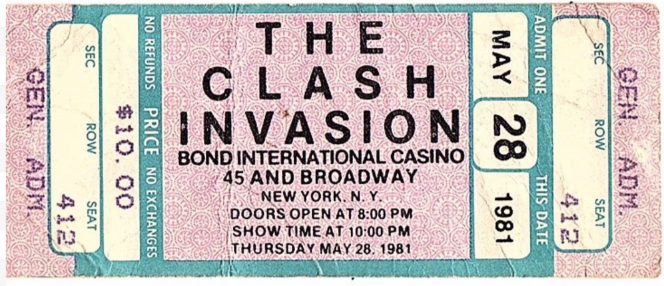
Unfortunately, London Calling, a song about nuclear war, and Rock The Casbah, a song about defiance against Iranian law banning music, have lost their meaning. It’s still baffling to me how London Calling has been reduced to a warm musical callback to a Friends TV episode. Thankfully, Magnificent Seven has a chance for its message to resonate. Despite what the media wants you to believe, workers desperately finding ways to unshackle themselves from the 9-to-5 treadmill has been a thing decades before the words “downsize”, “independent contractor” and “gig work” invaded the public’s discourse.
The growing sentiments against commuting to an office 40-plus hours a week have finally caught up with the deconstructive tone The Clash rapped about over 40 years ago. The 2020 Covid pandemic forced the global population to change their priorities, especially here in the United States. It’s as though the grossly overused “Getting out of the Matrix” metaphor had finally found a real world event to compare itself to. Millions of worker bees stopped and realized their overproduction of honey wasn’t as sweet for them as they were brainwashed to believe.
Since the pandemic, the debate on remote work still rages on. Employees not trusting employers have risen to the point where Capitalism as a whole is under major scrutiny. Last year (2023), labor strikes were widespread from UPS workers to Hollywood actors and writers. There wasn’t this much unionized activity since Ronald Reagan fired all the unionized Air Traffic Controllers in 1981, the same year Magnificent Seven was released.
Experimentation within new music can have a double edged sword. The Clash had experienced both. It must have been frustrating for them to have fans forcing Bond’s International to expanded the concert dates to 17 consecutive nights, while simultaneously remain anonymous on the radio because they stepped way out of their musical box. Yet, without these chaotic creative explosions, we wouldn’t have the unexpected pleasure of cherishing great, thought provoking records like Magnificent Seven.
Ready to go back? Why are you so shocked? What are you listening to…? No, it’s not an impersonation this time. That really was History of The World, Part 1 Mel Brooks rapping as King Louis XVI, and sounded good doing it! What did I say before about unpredictability in ‘81? C’mon, you can watch the rest of the movie on Netflix. Let’s head back to 2024.
Aaaannddd… we’re back. I hope this post was long enough to justify being gone for so long! It also helped me retool not just the Rap Waveback Machine, but also the records I choose to give their much needed flowers on this blog. Sometimes, people tend to forget or were too young to remember that rap music had a lot of enemies wishing for its demise, but it also had some unlikely allies to help push it forward. I’ll be shedding light on some of those examples because evolution doesn’t grow on its own. It needs random acts in the most unlikely places for it to grow.
As usual, I’ve left some videos and links to help you learn more. While you’re doing that, I’ll return, much sooner I hope, and chart another course to another exciting year time has forgotten. Til’ then, I’m ceetay, your time travel guide to the old school. Catcha next time! Seeeee Yaaaaa!
– The Clash’s Official Website
– 1981 Bonds International Concert Flyers
– Additional Info on the Bond’s International concert
– The meaning behind 1982 hit Rock The Casbah.
In between much needed time travel arrangements, and maintenance, ceetay’s off-time consists of sitcom TV watching, Mint Chocolate Chip ice cream eating and gathering thoughts and information about old school music that have been either forgotten or buried under mountains of predatory corporate copyright claims. If you ever find yourself standing close enough, you might catch ceetay muttering, “If creativity is not allowed to be inspired by its history, culture will inevitably lose its meaning.”
Hey, Wassup! Happy New… Year? I guess? Didn’t mean to ghost you after… how many months has it been now? Three… four months? Yeeeeaaaah, about that. Well, let me first back up and introduce myself for you first time blog readers. I’m ceetay, the Doctor Brown to your Marty McFly. With each post I invite you to step into my Rap Waveback Machine and travel back to the old school and celebrate what Rap and Hip Hip as a whole had to offer.
Now that’s out of the way, I’ll tell you why I’ve been MIA. While making the routine machine checkup, I found a few cracks underneath the right side of the engine haul. Without the proper replacement part, our time travel trips would’ve been over. But y’all know I wasn’t havin’ it! I searched all over the internet to find one dealer who had the right part at the right price. Ordered it and waited… and waited. Two months later, I still waited, til’ the package arrived. It took another month to figure out how to replace the damn thing. After countless tests, the Rap Waveback Machine is finally up to time travel regulations.
Now that you know, let’s go back to the year when the world watched Lady Diana Spencer marry Prince Charles during the “Wedding of the Century”. A year when American hostages in Iran were finally freed after 444 days. And a year when Raiders of the Lost Ark first exploded onto movie theaters. Get ready ‘cause 1981 was on like Donkey Kong!
Hit the play button!

The Clash. Why in the hell am I focusing on a white British Punk Rock band? Two words: Magnificent Seven. Okay, two more words: Magnificent Dance. Two years after putting rap on wax, it was still in its infancy; no one knew which direction it would go. It was also the perfect climate for a punk rock band to slip through and drop an instant classic while no one was looking.
When I first heard Magnificent Dance on the radio it grabbed my attention. The track started with guy saying:
Don’t you ever stop long enough to start/
Take your car outta that gear/
Don’t you ever stop long enough to start/
Get your car outta that gear.
Before I had the chance to understand what that meant, the rapid fire combination of bass, bongos, drums and triangle chimes assaulted my ear drums like an alarm clock. It was one of those lasting first impressions that musicians strive their entire careers to achieve. What came next was the steady drum beat and the familiar funky bassline used in early rap recordings. Soon after an electric piano, not a synthesizer, an electric piano slid in, sprinkling smooth, soulful piano chords. Completing the irresistible sound was a touch of electric guitar. All these ingredients combined created the perfect recipe for people to dance their asses off.

I hope you caught me mentioning Magnificent Dance not Magnificent Seven. If it weren’t for the weekend mastermixes constantly playing on overnight radio time slots, I would’ve missed either version of that song entirely! Yes, Magnificent Seven is technically a rap song, but it wasn’t treated as such, at least not in New York. It was never played on Mr. Magic’s Rap Attack on ‘BLS or on DJ Red Alert or Chuck Chillout’s weekend shows on KISS-FM. I only heard the instrumental, Magnificent Dance, simply because of a recording production practice called a remix.
This technique was introduced by Disco nightclub DJs. The main purpose was to expand the deejay’s creativity. They wanted to add elements to a song that were beyond what they could do during their live sets. If you’re thinking a remix is another word for a dub, think again. A dub is mostly an instrumental track with selected vocal echoes and reverbs scattered throughout the song. It has been commonly used within the Reggae genre. Anywho, the sad reality was, if Magnificent Seven didn’t have Magnificent Dance as an alternative, the record wouldn’t have had the chance to flourish. This was one of the early examples of how remixes changed the fate of a record.

There was no surprise the two most pulverizing new music styles were direct responses to Trickle Down Economics and the overall abandonment of the lower economic class. Rap and Punk Rock shared the same anger and rebellious spirit. They just expressed those emotions differently by creating two vastly different art forms. So, there shouldn’t have been a surprise when some artists in both genres decided to collaborate with each other. Now, don’t get it twisted. It wasn’t like the majority of Rap and Punk Rock fans, and musicians, came together to defeat a common enemy like Rocky Balboa and Apollo Creed in Rocky 3. It’s an annoying human trait to betray your own best interests. How else could you explain the popularity of U.S. President Ronald Reagan and British Prime Minister Margaret Thatcher during this time? These two politicians represented everything Rap and Punk Rock were against. Despite the racial and cultural differences, there were a few punk rock artists who hung out and worked with rap artists and participated in Hip Hip culture overall.
The most notable collaboration was Blondie. I never thought the band, fronted by lead singer Debbie Harry, who made Heart of Glass, One Way Or Another and Call Me into monster hits would ever make a bass heavy, disco song like Rapture. It was more shocking when Debbie started rapping about… I wasn’t sure what she was rapping about. However, that didn’t stop Rapture from hitting the #1 spot on the Billboard chart in 1981.
Blondie’s contributions went farther than that. They helped filmmaker Charlie Ahearn, which included producing the soundtrack for the groundbreaking Hip Hop film Wild Style. Also when Debbie Harry hosted SNL, she encouraged the show’s producers to invite Funky Four Plus One More as musical guests, making them the first rap group to perform on a national network broadcasting show.
Another notable collaboration was with Malcolm McLaren. He was the manager of the legendary British Punk Rock band, The Sex Pilots. Malcolm somehow caught wind of the music brewing in New York City and eventually teamed up with a rap duo called World Famous Supreme Team. MCs Sedivine The Mastermind and Just Allah the Superstar hosted a non-commercial overnight radio show on WHBI. It was an independent station that also gave Mr. Magic his start on New York radio. Malcolm McLaren and World Famous Supreme Team released their first hit Buffalo Gals in 1982 and went on to make several more hits.
Between Rapture and Buffalo Gals, Magnificent Seven (vocal version) didn’t have the notoriety or the commercial success the other two singles had. I’d argue that it may have been by design.

Did you know that contagiously funky Magnificent Dance remix was about class politics? No? Neither did I. It took me over a decade to discover there were lyrics to this song! I happened to stumble upon searching Magnificent Dance on Amazon one day on a whim. When the results revealed The Clash created that song, I immediately bought the CD that included their greatest hits.
Remember I mentioned earlier about the rapid fire percussion sounding like an alarm clock? It might have been on purpose. The first lines went: “Ring, ring. It’s 7:00 am/ Move y’self to go again…/” as if the rhyme was a direct response after an alarm clock jolted you out of your dream and into reality. The rap sounded good, so far. When my ears reached these lines:
Wave bub-bub-bub-bye to the boss/
It’s our profit. It’s his loss/
But anyway, the lunch bell rings/
Take one hour. Do your thanng!/
Take one hour? It dawned on me what this song was really about. It was a sardonic, mocking commentary about the daily 9-to-5 work rot. The Magnificent Seven hours people have to endure each day. My brain screamed “Why is this the first time I’m hearing this?” The lyrics made me love this song even more! It was a cleverly bold indictment of the brainless cog in the wheel syndrome inside the corporate machine.
It was a similar tactic to Dolly Parton’s mega hit 9 to 5, the title song to the hit movie of the same name. Not only were 9 to 5 and Magnificent Seven released in the same year, they also shared the same goal: to satirize the day-to-day life of the average worker. No, seriously. Skip past the obvious bias. Focus beyond the peppy, happy melody. Discover the words describing the daily slights and aggravating mistreatment workers routinely tolerate just to make a living.
The major difference between these two songs was The Clash used a style of music many didn’t know or respect. But let’s face it, the major offense was mocking the foundation of the capitalistic system. Try lobbying for a song that dares to utter Karl Marx and Fredrich Engels’ names and see how fast you’ll be banned from any radio station. This was one of the reasons The Clash became my favorite Punk Rock band.

Like most Punk Rock bands, The Clash had kick ass messages in their music. What separated them from other bands was how they embraced other forms of music like Disco/R&B; Rock The Casbah was their biggest crossover hit. I constantly heard it on heavy radio rotation on both Black and Top 40 radio stations. They played Reggae, which included the song Guns of Brixton; a song about a black British neighborhood that suffering under police brutality. Ain’t that a surprise?! It doesn’t just happen in the U.S., folks! Other genres they explored were Ska, Rockabilly, Country and Gospel. It was an eye opener to find out Grand Master Flash and The Furious Five was one of the opening acts for The Clash at NYC’s Bond’s International Hotel & Casino in 1981. So, it made sense they would record their own rap song and Magnificent Seven wasn’t the only one. Lightning Strikes (Not Once but Twice) appeared on the 1980 album Sandinista! If you lived in the U.S. or the U.K. in the 80s, the name of this album alone immediately gave away the band’s leftist politics, signaling the support against the U.S. backed, and funded Contras during the Nicaraguan civil war.

In terms of recognition in Rock and Punk Rock circles, The Clash has legendary status, deservingly so. In Rap music circles, unfortunately, they have been a footnote compared to Blondie and Malcolm McLaren, then and now. This was a missed opportunity for other groups to not only rap about political issue about race, but also a wider interracial discussion about class. The Clash could’ve helped spark that discussion as much as Public Enemy inspired discussion about black issues.
If it weren’t for The Clash’s overall influence, we may not have had The Beastie Boys. They started as a punk rock group with their first EP/album Polly Wog Stew in 1982. The next year, they recorded their debut rap EP: Cooky Puss. With the help of producer, Rick Rubin, they released their records under the Def Jam record label. They even persuaded Rubin to listen to a demo tape from an unknown Queens rapper named L.L. Cool J.
A decade after the groundbreaking RUN-DMC and Aerosmith’s crossover hit Walk The Way, Hard Rock and Rap merged, but their music was only played on rock radio stations. Limp Bizkit, Rage Against The Machine, etc., weren’t played on Black/R&B/Rap stations, at least in New York. Out of all the ‘90s Rap/Rock artists, Rage Against The Machine was the most similar to The Clash’s rebellious spirit.

Unfortunately, London Calling, a song about nuclear war, and Rock The Casbah, a song about defiance against Iranian law banning music, have lost their meaning. It’s still baffling to me how London Calling has been reduced to a warm musical callback to a Friends TV episode. Thankfully, Magnificent Seven has a chance for its message to resonate. Despite what the media wants you to believe, workers desperately finding ways to unshackle themselves from the 9-to-5 treadmill has been a thing decades before the words “downsize”, “independent contractor” and “gig work” invaded the public’s discourse.
The growing sentiments against commuting to an office 40-plus hours a week have finally caught up with the deconstructive tone The Clash rapped about over 40 years ago. The 2020 Covid pandemic forced the global population to change their priorities, especially here in the United States. It’s as though the grossly overused “Getting out of the Matrix” metaphor had finally found a real world event to compare itself to. Millions of worker bees stopped and realized their overproduction of honey wasn’t as sweet for them as they were brainwashed to believe.
Since the pandemic, the debate on remote work still rages on. Employees not trusting employers have risen to the point where Capitalism as a whole is under major scrutiny. Last year (2023), labor strikes were widespread from UPS workers to Hollywood actors and writers. There wasn’t this much unionized activity since Ronald Reagan fired all the unionized Air Traffic Controllers in 1981, the same year Magnificent Seven was released.
Experimentation within new music can have a double edged sword. The Clash had experienced both. It must have been frustrating for them to have fans forcing Bond’s International to expanded the concert dates to 17 consecutive nights, while simultaneously remain anonymous on the radio because they stepped way out of their musical box. Yet, without these chaotic creative explosions, we wouldn’t have the unexpected pleasure of cherishing great, thought provoking records like Magnificent Seven.
Ready to go back? Why are you so shocked? What are you listening to…? No, it’s not an impersonation this time. That really was History of The World, Part 1 Mel Brooks rapping as King Louis XVI, and sounded good doing it! What did I say before about unpredictability in ‘81? C’mon, you can watch the rest of the movie on Netflix. Let’s head back to 2024.
Aaaannddd… we’re back. I hope this post was long enough to justify being gone for so long! It also helped me retool not just the Rap Waveback Machine, but also the records I choose to give their much needed flowers on this blog. Sometimes, people tend to forget or were too young to remember that rap music had a lot of enemies wishing for its demise, but it also had some unlikely allies to help push it forward. I’ll be shedding light on some of those examples because evolution doesn’t grow on its own. It needs random acts in the most unlikely places for it to grow.
As usual, I’ve left some videos and links to help you learn more. While you’re doing that, I’ll return, much sooner I hope, and chart another course to another exciting year time has forgotten. Til’ then, I’m ceetay, your time travel guide to the old school. Catcha next time! Seeeee Yaaaaa!
– The Clash’s Official Website
– 1981 Bonds International Concert Flyers
– Additional Info on the Bond’s International concert
– The meaning behind 1982 hit Rock The Casbah.
In between much needed time travel arrangements, and maintenance, ceetay’s off-time consists of sitcom TV watching, Mint Chocolate Chip ice cream eating and gathering thoughts and information about old school music that have been either forgotten or buried under mountains of predatory corporate copyright claims. If you ever find yourself standing close enough, you might catch ceetay muttering, “If creativity is not allowed to be inspired by its history, culture will inevitably lose its meaning.

Hey, y’all! ceetay here! Okay, let’s cut to my lame excuse. I had to move
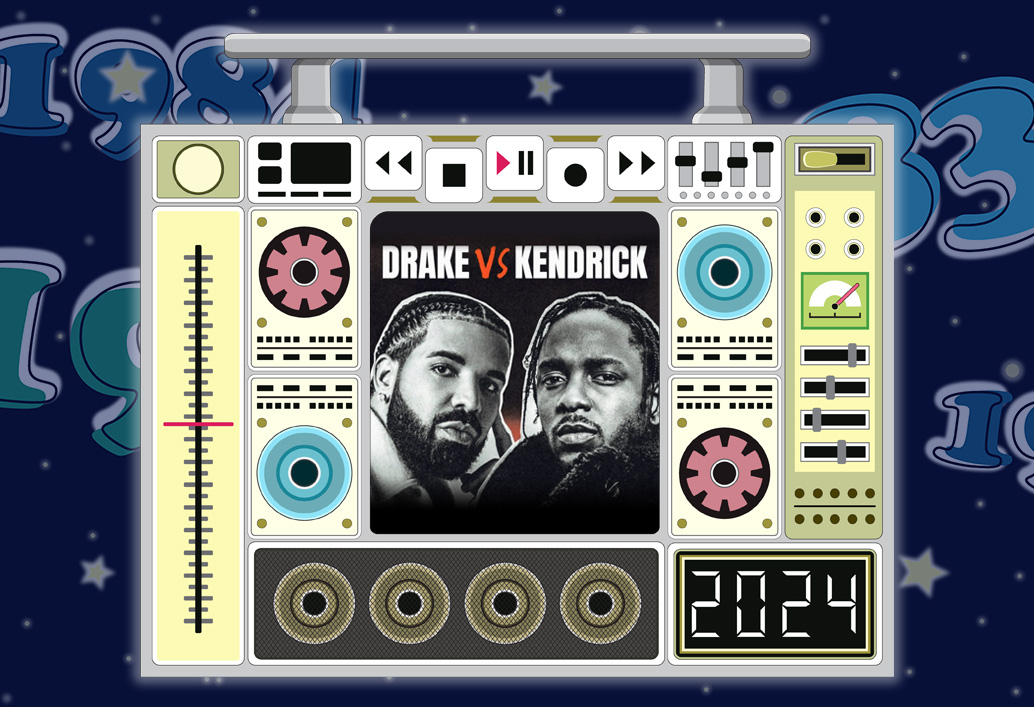
Wassup! ceetay here, the Doc Brown to your Marty McFly. Okay, I’ll just cut to